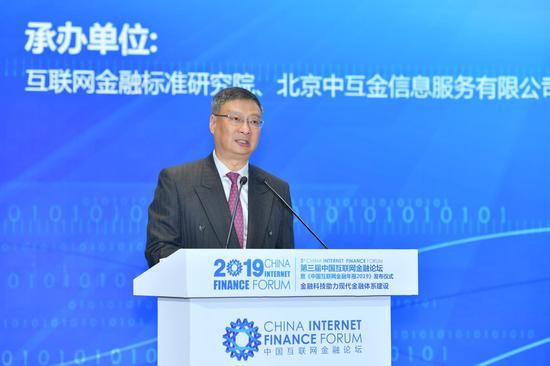Li Lihui, Former President of Bank of China: We should step up efforts to improve the technical standards and security specifications of blockchain finance
Source: Sina Finance
Sina Finance News on December 17th, the 3rd China Internet Finance Forum 2019 was held in Beijing on the theme of "Financial Technology to Facilitate the Construction of Modern Financial System". The leader of the Blockchain Research Working Group of China Internet Finance Association and Bank of China Former President Li Lihui attended the event and delivered a keynote speech.

Li Lihui, the leader of the Blockchain Research Working Group of the China Internet Finance Association and former president of the Bank of China, attended the event and delivered a keynote speech.
- Behind the growth of 3.5 times a year, can the unstoppable DeFi fulfill the vision of "decentralization"?
- Babbitt Column | What is the "occupation of occupation" that the mining industry is concerned about?
- Pan Gongsheng, deputy governor of the central bank, talks about the crackdown on virtual currencies: avoiding the risk of a large-scale virtual asset bubble
Li Lihui believes that the application of blockchain technology has extended to many fields such as digital finance, the Internet of Things, intelligent manufacturing, supply chain management, and digital assets. Talking about how to evaluate the current status of blockchain technology and industrial development, he believes that the underlying technology of the blockchain is not yet mature, and the technical bottlenecks of large-scale and reliable applications need to be broken. It is currently in the period of great opportunities for the development of blockchain technology and industrial innovation.
In Li Lihui's opinion, it is necessary to establish a sandbox experiment system for digital financial innovation, and actively explore new models and new regulations for digital financial business supervision. In the construction of digital finance, we should actively participate in and strive for the right to speak and dominate the relevant international rules and standards, strengthen international regulatory coordination, promote regulatory consensus, and establish uniform international financial regulatory standards for digital finance.
The following is the actual record of the speech:
Li Lihui: Dear Chairman Xiao, Chairman Li, Chairman Wang, Minister Gu, leaders, guests, friends, everyone, everyone!
I am very glad to attend the 3rd China Internet Finance Forum, and my topic is "Mastering Independent Controllable Technology to Accelerate the Construction of Digital Technology Standardization". General Secretary Xi clearly pointed out that the blockchain should be used as an important breakthrough in independent innovation of core technology, the main attack direction, investment should be strengthened, focus on overcoming a number of key core technologies, and accelerate the development of blockchain technology and industrial innovation. From the height of the national strategy of the digital economy, the general secretary's speech pointed out the main attack direction, key paths and basic principles of the development of blockchain technology and industrial innovation, and clarified the strategic guidelines for the development of digital finance.
The application of blockchain technology has been extended to digital finance, the Internet of Things, intelligent manufacturing, supply chain management, digital assets and other fields. How to evaluate the current status of blockchain technology and industrial development, my view is the underlying technology of the blockchain The technology bottleneck for large-scale and reliable applications is yet to mature, and we are in a period of great opportunities for blockchain technology and industrial innovation and development.
In the underlying technology, as a technological innovation, the technology of the basic components such as the database of the blockchain, peer-to-peer network, and cryptographic algorithms is relatively mature, but we need to meet the new requirements to integrate the technologies of the basic components together. Requirements. At the same time, new technologies such as the blockchain's unique consensus mechanism and smart contracts still need to be further improved.
The attitudes and trends of developed countries on digital finance deserve our attention. The United States pays special attention to the regulation of digital financial markets. The focus of US regulation is to regulate digital financial markets and prevent digital financial instruments from being used in illegal areas. In 2017, the US Securities and Exchange Commission included ICOs under supervision. Coins issued after regulatory approvals belong to securities, and ICOs without regulatory approvals are illegal securities offerings. The US Commodity Futures Trading Commission approved the launch of bitcoin futures trading by the Chicago Futures Exchange and the Chicago Mercantile Exchange. In 2018, the US Securities and Exchange Commission's corporate financial department, investment management department, and market trading department jointly issued a statement that participants in encrypted digital currencies that are involved in securities transactions but do not register or apply for exemption will face the enforcement of this agency. The regulatory strategy of digital cryptocurrencies is to explain securities laws through case enforcement and non-systematic, so as to carefully and orderly clarify the principles and boundaries of supervision.
Germany and France are concerned about digital sovereignty. On October 29, 2019, Germany and France announced the "Gaia-X" with the participation of German and French core companies, aiming to build a secure and reliable data infrastructure for Europe. The German economy The minister said that this infrastructure will help us regain digital sovereignty and lay the foundation for the digital ecosystem. The French economy and finance minister said the project would include data storage, data concentration and data sharing. German Chancellor Angela Merkel said that what worries me most is the processing of conventions and consumption data, which are mostly done by American companies, and are forming a dependency relationship. Merkel advocates taking a long-term perspective and digitizing the overall layout from a European perspective as much as possible. The UK is focusing on innovative experiments in digital finance and pioneered the sandbox supervision model as early as 2015. Under the sandbox mechanism, fintech companies can break through the constraints of existing regulations and conduct innovative experiments in digital finance products, services, business models, and marketing methods.
What will China do? We should implement the national strategy of the digital economy and promote digital financial innovation.
The first is to master autonomous and controllable technologies. According to the research of the China Internet Finance Association, China currently lacks independent property rights on the underlying technologies such as the consensus mechanism and smart contracts of the blockchain. Most application projects use the open source blockchain underlying platform to adjust and develop the applicability. It optimizes the number of concurrent users, throughput, reliability, security, etc., adapts to business needs, and implements identity verification, privacy protection, and node management. And other functions. The widespread application of foreign open source programs may lead to technical dependence risks, and must comply with the jurisdiction and legal constraints of the place where the open source platform is registered, which has hidden geopolitical risks.
In November 2019, the United States and Japan reached a data agreement. One of the important pillars of this agreement is that in principle the state is forbidden from forcing companies to disclose the original code and algorithms. China is a big data country and a big hash power, but we are a weak algorithmic country. We have a lot of original code, and the basic low-level algorithm programs rely too much on the United States and other Western countries. Therefore, we should vigorously support technological innovation, strive to master the dominant power of digital technology, clarify that digital technology and digital industry policies provide preferential taxation for digital enterprise R & D and talents, and encourage the development and application of digital technology. Encourage "Chinese + foreign investment", "big, medium + small and micro" to master independent and controllable intellectual property rights in key areas of digital technology, and to establish global competitive advantages in key areas of digital economy and digital finance.
The second is to accelerate the construction of standardization and system innovation. China Internet Finance Association has done a lot of work in the standardization of digital finance and achieved remarkable results. In terms of blockchain financial standardization and institution building, we have just started. The International Organization for Standardization ISO has established a technical committee for blockchain and distributed nodes. There are 11 node standards, including terminology, reference architecture, privacy, personal information protection, security risks, and vulnerabilities. The International Telecommunication Union has established a database of security issues related to distributed ledger technology, covering aspects such as security assurance, security threats, and security framework. The IEEE International Institute of Electrical and Electronics Engineers has developed standards for the IEEE, focusing on the blockchain's data management in the Internet of Things, digital asset management, government department applications, and cryptocurrencies. We should pay close attention to improving the technical standards, security specifications, and certification review systems for blockchain finance. In law, we should clarify the legal definition of digital assets, the contractual nature of smart contracts and its effectiveness, and the responsible subjects, behavioral norms and regulatory standards under a distributed architecture.
I think it is necessary for us to establish a sandbox experimental system for digital financial innovation and actively explore new models and new regulations for digital financial business supervision. I also particularly agree with President Xiao's point that digital finance is bound to further strengthen financial globalization. In the construction of digital finance, we should actively participate in and strive for the right to speak and dominate the relevant international rules and standards, strengthen international regulatory coordination, promote regulatory consensus, and establish uniform international financial regulatory standards for digital finance.
These are some of my thoughts and opinions, thank you all!
We will continue to update Blocking; if you have any questions or suggestions, please contact us!
Was this article helpful?
93 out of 132 found this helpful
Related articles
- No avatar! Parity announces abandonment of Ethereum client and focus on Polkadot
- Pan Chao: 4 Common Mistakes in DeFi Governance
- R3 has completed the largest on-chain trade finance pilot project to date, with more than 70 organizations from 25 countries participating together
- Babbitt Column | The market lacks a stable income stablecoin
- Gavin Wood: Zuckerberg's Libra has fundamental problems, or is included in historical footnotes
- Analysis: Behind the Real Prosperity of German Blockchain Ecology
- After Bitcoin aimed at Ethereum, how did Fidelity lay out the crypto market?






